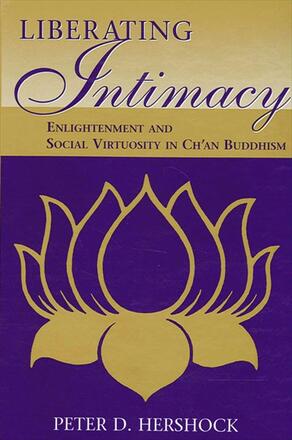
Liberating Intimacy
Enlightenment and Social Virtuosity in Ch'an Buddhism
Alternative formats available from:
Description
Liberating Intimacy dramatically reevaluates the teachings and practice of Ch'an Buddhism. Considering Buddha's insight that everything is empty or absent of a permanent and independent "self nature," Hershock argues that not only is suffering without any essence and so dependent on time and place, so is end of suffering or enlightenment. He shows that the tradition need not entail a quietistic withdrawal from social life. Far from being something privately attained and experienced, Ch'an enlightenment is best seen as the opening of a virtuosic intimacy through which we are continually liberated from the arrogance of both "self" and "other." That is, enlightenment in Ch'an must be understood as irreducibly social—it can never be merely "mine" or "yours," but is only realized as "ours." Including new translations from the teachings of Ma-tzu, Pai-chang, Huang-po and Lin-chi, Liberating Intimacy reconciles the almost fierce individualism that characterizes the mastery of Ch'an and its unwavering embrace of the ideal of compassionately saving all beings.
Peter D. Hershock is Project Fellow of the Asian Studies Development Program at the East-West Center.
Reviews
"This is the best book I have ever read on the Ch'an Buddhist tradition. Hershock articulates and defends his thesis with insight, power, and elegance. Enlightenment is ultimately about intimacy, sociality, and virtuosity. It is a central, yet heretofore ignored, aspect of not only the Ch'an Buddhist tradition in China, but also the Soto (Zen) tradition in Japan. If you understand Hershock on Ch'an, you are well on your way to understanding Zen Buddhism according to Dogen Kigen as well. Moreover, you will leave this work with an enriched understanding of an entire tribe of unsuspecting kindred spirits; specifically, you may want to reread the works of Watsuji Tetsuro Dogen Kigen, Aristotle, Alisdair MacIntyre, Jurgen Habermas, and Richard Rorty. This book ranks with those of Chung-yuan Chang whose early classics on Ch'an Buddhist philosophy introduced western philosophers to the rigor, complexity, and logic, if you will, of the most interesting of all Chinese Buddhist traditions." -- David E. Shaner, Furman University
"This work makes us re-think our views of the history, philosophy, and practice(s) of Ch'an; and it makes us re-think a number of other fundamental philosophical issues as well. It offers an original and important interpretation of the nature and scope of enlightenment in the Mahayana Buddhist tradition in general, and as found in Ch'an (Zen) in particular. It is a significant work, and will take a place alongside Collins' Selfless Persons and Griffith's On Being Mindless as a major contribution to twentieth-century Buddhist philosophical thought." — Henry Rosemont, Jr., St. Mary's College of Maryland/Fudan University, Shanghai